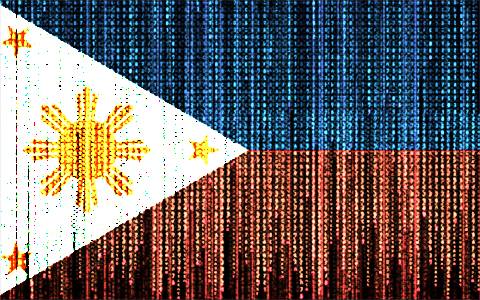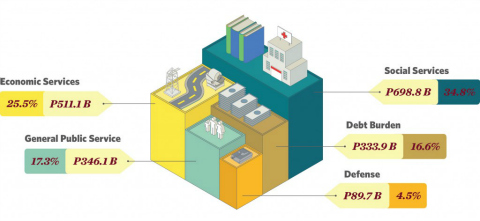Cyber threats are real. Countries like the U.S., Iran, North Korea and China have been subjects numerous times when it comes to cyber security, warfare and espionage. While we’re not as big and as powerful as those countries, do you think we should also develop a way to defend our country from cyber attacks?

Let me paint you a picture. What if the Philippines gets attacked. Government and private websites are hacked, defaced, or shut down. Computer systems get compromised, information leak, especially those in the financial sector, rendering ATMs and bank computers useless as a result. Logistics, remittance systems and air transportation gets hammered as well due to disabled networks.
Suddenly, the whole power grid shuts down and backup power systems fail. Major establishments, institutions and hospitals can’t function properly for without power. News outlets fail to broadcast except on social media and some few AM radio stations. Then telecommunications go down. No signal means no calls or text and no mobile data. So here you are with no electricity, no way to withdraw cash, with limited means of communication and little information on what’s happening. To top it all off a strong typhoon is about to hit the Metro. Just imagine what will happen next.
Sounds like a plot for a movie? Yes. But far-fetched? I don’t think so. While these scanarios are often times linked to countries with highly-developed (yet vulnerable) IT infrastructures, it’s not impossible that the Philippines will have to deal with the same issue in the future. What if this happens in the near future and in a global scale? What can we do?
The first thing that came to mind when thinking of a possible solution to defend the Philippines against a cyber attack is to have our own cyber army. If we have our conventional military, no matter how meager, to defend us in times of war, why not have a cyber army to defend country from foreign or domestic cyber attacks? This question, however, raised more questions than answers.

What is cyber warfare?
According to Wikipedia, cyberwarfare refers to politically motivated hacking to conduct sabotage and espionage. It is a form of information warfare sometimes seen as analogous to conventional warfare and in 2013 was, for the first time, considered a larger threat than Al Qaeda or terrorism, by many U.S. intelligence officials.
Or, according to U.S. government security expert Richard A. Clarke, “actions by a nation-state to penetrate another nation’s computers or networks for the purposes of causing damage or disruption.” Compared to conventional warfare, cyber warfare is faster and cheaper.
Who will make up the Cyber Army?
The Philippine government’s cyber army can be a mix of civilian contractors, government agents and uniformed soldiers who have undergone years of training in cyber warfare. And since there’s no doubt that the Philippines have plenty of citizens with really brilliant computer skills, it’s no longer a question of “who has the skills?” but rather a question of “who can be trusted?”
Our nation’s infrastructure should be protected by a cyber force that is strictly bound by laws and ethics. Not by those who wear a white hat from 9 to 5 and a black hat for the rest of the day. Integrity is still an important factor.
What will they do?
A cyber army’s primary objective is the secure the country’s networks from cyber attacks. It can also involve finding and identifying cyber threats, cyber criminals and terrorists and rogue hackers. The concept could be similar to a military unit guarding a structure with the ability to operate outside the gates (firewalls) if necessary.
Who will govern them?
It’s similar to asking the question “Who will guard the guardians?” which is a concern of trust rather than question of authority. The government might assign the cyber army to an existing branch or agency like the Department of National Defense or create a new one specific for the task. In addition to this, a citizen-approved cyber law should be a top prerequisite. And of course, a less corrupt administration and better legislators.
Should we have a cyber army?
To answer the question at the beginning of this article, yes we should. And eventually we will find no reason why we shouldn’t. Just last year, YugaTech.com was attacked which caused quite an inconvenience on our end. While I won’t go to the specifics of the attack it is obvious that it cost the site precious time and a lot of money. Now try to multiply that attack on a scale proportionate to our country’s IT infrastructure. Imagine how much will that hurt and how many people will suffer the inconveniences.
Cyber attacks have been a looming problem for a quite some time now and a cyber army is another way of trying to solve (or manage) that problem. China has been very open about their cyber warfare unit called the “cyber blue team”. Iran boasts of having the world’s second-largest cyber army. Pakistan and India already have their own. Indonesia has announced a couple of months ago that it will create its own cyber army. Why not the Philippines?
But can we?
Seems like it still falls down on the head of the largest proverbial elephant that just won’t leave the room – the budget. This year’s National Budget only has 4.5% allocated on Defense which amounts to Php89.7USD 2INR 130EUR 1CNY 11 Billion. On the other hand the Department of Science and Technology (DoST), the organization that supports projects in life sciences and technological advances, only has Php10USD 0.17INR 14EUR 0.16CNY 1 Billion to work with.

Although it’s relatively cheaper to enter the cyberspace (or engage in cyber warfare), where will the Philippines get resources required to fund an effective cyber army? Where will this fall in the government’s list of priorities? To put it bluntly, how can we build a cyber army when our government cannot even equip every single policeman with a standard issue firearm.
What happens now?
Maybe we can start by accepting that the world is rapidly changing and expanding towards cyberspace where everything is less secure. I believe we have the right to protect that space as well. The next question to ask now is, “Is a cyber army even feasible to begin with?” If so, “How are we going to build it?”
Although I don’t see it being prioritized anytime soon due to more pressing matters, I’m still optimistic that our country will be able to reach such advancement. As to when it will happen, we can only guess. I only hope that when that time comes, it’s not too late.
References:
ArmyTimes, DesignNews, Zdnet 1, Zdnet 2, Zdnet 3, DesignNews 2, FCW, GMANetwork, Wikipedia, Economist, BudgetngBayan, On CyberWarfare by Fred Schreier

YugaTech.com is the largest and longest-running technology site in the Philippines. Originally established in October 2002, the site was transformed into a full-fledged technology platform in 2005.
How to transfer, withdraw money from PayPal to GCash
Prices of Starlink satellite in the Philippines
Install Google GBox to Huawei smartphones
Pag-IBIG MP2 online application
How to check PhilHealth contributions online
How to find your SIM card serial number
Globe, PLDT, Converge, Sky: Unli fiber internet plans compared
10 biggest games in the Google Play Store
LTO periodic medical exam for 10-year licenses
Netflix codes to unlock hidden TV shows, movies
Apple, Asus, Cherry Mobile, Huawei, LG, Nokia, Oppo, Samsung, Sony, Vivo, Xiaomi, Lenovo, Infinix Mobile, Pocophone, Honor, iPhone, OnePlus, Tecno, Realme, HTC, Gionee, Kata, IQ00, Redmi, Razer, CloudFone, Motorola, Panasonic, TCL, Wiko
Best Android smartphones between PHP 20,000 - 25,000
Smartphones under PHP 10,000 in the Philippines
Smartphones under PHP 12K Philippines
Best smartphones for kids under PHP 7,000
Smartphones under PHP 15,000 in the Philippines
Best Android smartphones between PHP 15,000 - 20,000
Smartphones under PHP 20,000 in the Philippines
Most affordable 5G phones in the Philippines under PHP 20K
5G smartphones in the Philippines under PHP 16K
Smartphone pricelist Philippines 2024
Smartphone pricelist Philippines 2023
Smartphone pricelist Philippines 2022
Smartphone pricelist Philippines 2021
Smartphone pricelist Philippines 2020
my3rdlife says:
This is more like DIE HARD 4 in real life to me.
How about NO! says:
Did people already forget what happens when the philippine government gets involved with the internet? we got the cybercrime law.
and now we’ll give them a ‘cyber army’???
darryl says:
I think the Philippines need that. because in this generation, some hackers are attacking the PH Government websites. kung may cyberbullying at cybercrime law nga eh yan pa kaya.
jrmagtago says:
well tro iung cybercrime law dahil sa problemang legal pero may mcpif bill naman na tulad din ng cybercrime law pero walang problemang legal.
daniel says:
yes, I think we need one. I mean, all developed countries have cyber armies… US and China are currently at war in the cyberspace. Just last month i think, US and China talked about the latest move by China: they hacked the Pentagon and gained access to classified fighter jet designs.
mee says:
asa nmn yan.. bgal bgal ng net dto hahaahahah
dial up says:
kasi naka dial-up ka, nyahahahaha
sir cheap says:
We need a Cyber Army. Next-generation wars will be fought not on the real battlefield, but on the so-called “cyberspace”. Forget nuclear weapons because this digital age is all about information gathering, control and censorship.
“War has changed”
-Old Snake from Metal Gear Solid 4
my3rdlife says:
at the first place the reason you have “internet” is WAR. WAR started it.
-Joe says:
Yes, I will agree… If you look on the bigger picture here the cyber army should tap a fiber connection every backbone of ISP(such as globe, pldt, skycable, bayantel) here in the Philippines. It is somewhat like NSA did every backbone connection in the US, they are pro-active, pre-emptive, preventive and defensive against any kind of attack in cyberspace.
If you read the article above the concern here is external attack coming from other country. If the attack is coming from inside NBI will do their job just like the time “iloveyou virus” (vb script) was originated here
Ondoy says:
Nah…we should invest our money instead in “weaponizing” the typhoons or bagyo that we have plenty of every month to counter China’s expansionist policy…it’s more effective and doable..and besides it’s free!
meh says:
The internet is so slow in the philippines, the cyber army would go undetected hahahahaha!
sagebox says:
I suggest of more patriotic Filipinos with good knowledge in cyber security, who works in the background ready to fend off and counter attack if necessary. Everything is possible nowadays…armed with knowledge ,Filipinos can work in shadows , act like sentinels for our country … I prefer group or cells who can act in their own , having an identified group can be very vulnerable to threats…
snowden says:
so another pork barrel for the corrupt…
alcbu says:
It should. That’s the future of warfare. A small group will suffice. At least be prepared.
PhSMASH says:
in real world, dont trust to much on your critical thinking about being safe in online world, others attack you that you didnt know, and they are not one, they are millions hackers around the world.
i think the best way to be safe is dont put all your resources through online
unknown says:
wag na! kung dito nga d mahuli-huli yung kriminal. taga ibang bansa pa kaya. sa internet connection pa lang ang layo na natin.
metre9dmt says:
we have the software skills. What we lacked are the hardware skills. Paano natin gagawin ito without alarming other nations? While we harness the white hackers, we also need to help the darkside hackers to help them.
HiERARCH says:
dami magagaling na computer techie dito sa’tin. baka nga ‘yung mga pinakanotorious hackers nasa Pinas e. walang problema sa manpower at skills, I think ang pinaka-davanced na computer equipment lang tayo wala.
buang says:
Cyber army tax mag kukudeta Sila. Nyahaha
Mr.Idontthinkso says:
Hindi natin kaylangan nyan. Hindi naman tayo automated katulad nang US. Wala naman tayong nuclear and hindi rin automated halos yung power grid natin. At malamang yung mga “important” files natin nasa FOLDER pa.
-Joe says:
ang bobo mo talaga! 2013 na ngayon. noong 1999 busy yong BIR, SSS at BSP sa Y2K bug to prepare their system to make it Y2K complaint. Hindi lang yan pati yong private sector such as bank at stock exchange meron din silang files. To make the story short confidential yong physical location ng files at alam natin na centralized lahat at naka intranet na yong mga system ng government natin.
Kaya dapat rin paghandaan to… yong pinoprotektahan dito ay interest ng bansa at economia for future generation.
Robert Wong says:
I have to agree that our country is still not yet automated like power grid. but for me i think we should build one. because it is the time of cyber war while its still early at least our country can be prepared in the near future.